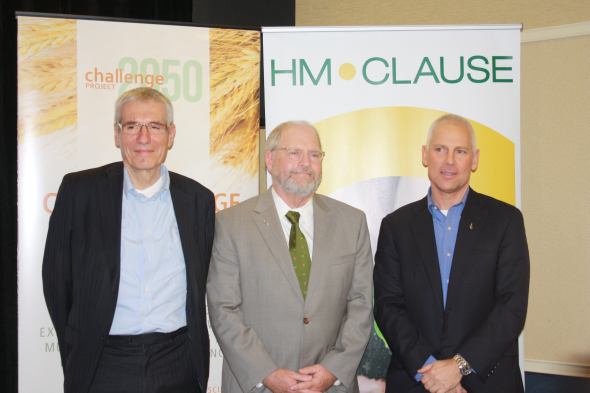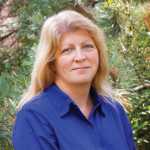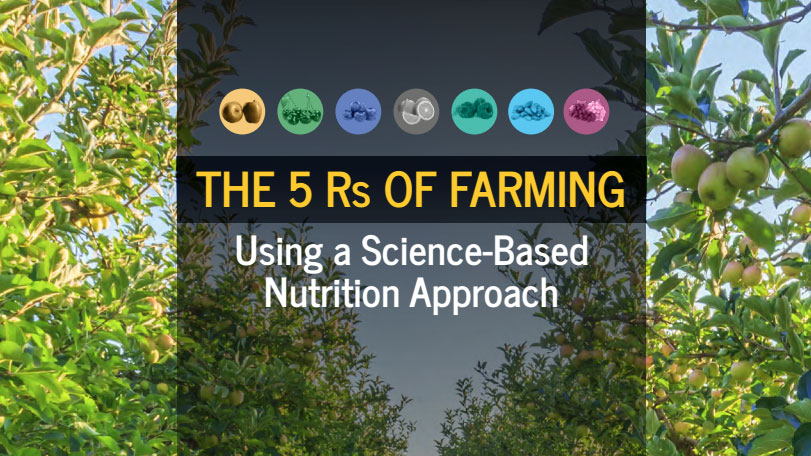University Of Florida, Limagrain, HM.CLAUSE Unveil Details Of Strategic Collaboration

Daniel Cheron (left), CEO of Limagrain; Jack Payne (center), senior vice president for agriculture and natural resources at the University of Florida, and Matthew Johnston, CEO HM.Clause were on hand in Gainesville, FL, during a press conference announcing the ongoing collaboration between the seed company, its subsidiary, and the University of Florida.
Photo credit: Rosemary Gordon
Sharing the goal of helping to feed the world, the University of Florida’s Institute of Food and Agricultural Sciences (UF/IFAS) and HM.CLAUSE, a business unit of Limagrain, the fourth largest seed company with its roots in France, announced Monday at a news conference in Gainesville, FL, additional details regarding an ongoing collaborative effort designed to tackle issues such as feeding a growing population and dealing with other global problems.
“The partnership with Limagrain and its subsidiary HM.CLAUSE provides exciting opportunities for not only our researchers but also our students who are actively engaged in finding solutions to issues like feeding our growing world population, using our limited natural resources in sustainable ways, and preparing agricultural leaders to work together in new ways,” said Jack Payne, senior vice president for agriculture and natural resources at UF/IFAS.
Payne said UF/IFAS shares common values with Limagrain, such as cooperation, progress, and perseverance that guide the university.
“And like Limagrain, we place our people at the heart of our organization,” he said. “We both realize that to advance we must invest in innovation and we know that no one succeeds alone. This partnership will move us further and faster, and research and science are on the path to better living and a better quality of life for people of the world.”
Limagrain’s CEO Daniel Cheron added that through cooperatives, the goal is to help farmers produce the quality and the quantity to feed the world, and by the year 2050 we are taking on the challenge of feeding more than 9 billion people.
“To be successful and reach the goal of feeding the world we need to develop partnerships with universities in different countries,” Cheron said. “I’m very pleased we have developed this partnership with the University of Florida.”
Part of that partnership comes in the form of UF/IFAS’s Challenge 2050 Project with a focus on preparing global leaders. According to Payne, HM.CLAUSE, a global vegetable seed company, and Limagrain approached UF/IFAS about a partnership that originally began with students. Limagrain provided UF/IFAS with about $300,000 in student support that allowed the university to develop a certificate program known as Challenge 2050.
Payne says it isn’t just about agriculture, either. The challenge also encompasses issues with resources, human health, engineering, and socio-economic problems.
In addition, part of the plan with Limagrain also includes internships for students to help them get hands-on experience, and an executives-in-residence program to assist with the exchange of knowledge.
“We think the work being done with the Challenge 2050 program is important,” said Matthew Johnston, CEO of HM.CLAUSE. “We think it is going to be one of the programs that has the potential to make a significant contribution. Lots of places are doing research to solve some of the production problems. Plenty of that is being done here [in Florida] but few institutions are thinking about how you bring all those different systems and processes together, and I think the work being embarked on in the Challenge 2050 program has a huge potential and we are very pleased to be a part of it.
“We are only at the beginning of scratching the surface of what we can do together to collaborate in areas like pathology, entomology, and plant breeding,” he added.










